- Home
- Newt Gingrich
Pearl Harbor: A Novel of December 8th Page 2
Pearl Harbor: A Novel of December 8th Read online
Page 2
Then more flashes, dozens of them, flickering, bursts of light rippling along the ocean’s surface.
Cecil raised his field glasses, squinting as he focused, the flash of the guns ruining his night vision, momentarily catching the silhouettes of the ships: cruisers, maybe even battleships. Nearly half a minute passed, and then the continual rumble of noise washed over them, and from the town to the north, flashes as well, shells detonating along the waterfront, silent from this distance, noise yet to reach them.
Captain Cecil Stanford looked back at Marine Sergeant Harris.
“It’s begun, sir,” Harris whispered.
Pearl Harbor, Oahu
Hawaiian Territories
5:50 a.m. Local Time
The damn cigarettes were killing him. He had already crumpled up one pack of Lucky Strikes and pulled out the second one, the reserve, hidden inside his breast pocket. He had long ago mastered how to do it with one hand, “the claw,” as he called it, grasping the pack as he fished out a cigarette, putting it to his lips with his “real” hand.
Pacing back and forth in front of the main administrative office, Commander James Watson kept a steady eye on the gate, waiting for Admiral Kimmel to arrive. He had hounded the night desk repeatedly to put a call through to Kimmel’s home and had repeatedly been told that the admiral would arrive shortly. Though he was jumping far above the chain of command, at some risk to himself, he felt five minutes with Kimmel might finally generate some proper response, at least get more of the reconnaissance PBYs up earlier than usual.
Goddamn! Kimmel was most likely still asleep.
It was early twilight, the sky to the east, glowing bright, stars still shining to the west, visible through the scattered broken clouds, typical of a tropical dawn.
The air was rich with the scent of the ocean, mixed in with the smells anyone in the navy was familiar with: diesel oil, some fumes from a tug heading down the main channel, its engine rumbling. The base was quiet except for the chatter of morning birds and nearby the muffled yawn of a shore patrolman, as he shifted back and forth on his feet, waiting out the last few minutes before his relief came out and he could hit the rack.
And yet Commander Watson was wide awake, his nerves jittery from the cigarettes chain-smoked through the night, the half-dozen cups of coffee, and the silence, the overbearing silence down in the basement office of Naval Intelligence.
Silence because the genuine Japanese signal traffic had dried up. Dried up for days now. The vast ocean of noise of the technology of radio, audible to those who had the tools to listen, was usually a ceaseless cacophony. Ship-to-ship communications, idle messages tapped out at three in the morning between bored men on radio watch, sometimes even playing chess by telegraphy, weather reports, even the false traffic put out to confuse. Other ships were “talking,” but the Japanese had gone completely silent. It reminded him of the bad line from many a Western, that it was “too quiet” out there. A flight of B-17s had signaled in an hour ago, announcing their approach by eight in the morning. The usual traffic of commercial steamers traversing the vast distances of the Pacific. A few radio checks from cargo ships, tramp steamers, an echo from the Indian Ocean of a British destroyer, but silence where it counted the most.
Everyone in the basement of Naval Intelligence knew, felt certain, something was coming; the warnings of the last few days from Washington, his own coded signal to his friend in Singapore, who confirmed the report that Japanese transports had been sighted near the coast of French Indochina and that his friend was leaving Singapore to go up the coast to look around.
But from the main battle fleet of the Japanese, their vaunted battleships and carriers, silence, other than a clatter of traffic from bases in the Sea of Japan. But that clatter just didn’t have the right feel. The traffic was fake, false signals sent to delude a listener into thinking the main fleet was still in home waters. Though he and his team had yet to break the new code, several times the sequencing of numbers had been identical, though spaced a day or so apart. His suspicion: the signalers were reading off a well-prepared script and had gotten a bit lazy, repeating supposed messages from a day or two earlier.
Also, his best “listeners” claimed, and he believed them, that they knew the “fist” of various operators, each telegrapher having slight idiosyncrasies that a well-trained ear could instantly recognize, as distinct as the difference between a Brooklyn versus a Louisiana accent. They even had nicknames for them, “Long A,” “Too Fast,” “Sloppy Ending.” And his listeners claimed that all those men on the other side, whom they knew so well, had stopped sending more than a week ago, replaced by others. Over coffee, the whispered agreement was that the Jap carriers were all at sea. With each passing day, he had, on a small folding map kept in his desk, drawn a wider circle, ranging outward another four hundred miles as to where they might be.
That circle, this morning, lapped far beyond the Marshalls, down to the coast of New Guinea, and arced up to within less than three hundred miles of here, the Hawaiian Islands.
Somewhere out there the main striking force of the Japanese Fleet must be moving, and when they moved they would move to strike and not dally about; therefore they were at the forward edge of the circle on his map. He could not shake from his mind the comment of a friend, who in a day or two might be his enemy, about what Japan had learned from its war with Russia of forty years past. The first strike must be the fatal blow to their enemy if ever they had a hope of winning.
He stopped his pacing and looked back across the narrow harbor. Eight battleships of the line were tied off, a ninth in dry dock. They were what most considered to be the strength, the backbone of America’s presence in the Pacific. If I were to make a fatal blow, it would be against them.
He stubbed out the cigarette on the pavement, ignoring the slightly perturbed look of the marine guard stationed outside the administrative headquarters of base. To hell with looking for a bucket to snub out the butt. He fished another cigarette out of the pack and lit it.
Looking back to the main gate he saw a taxi pull up, and absurd as it was, he started toward it. Kimmel always arrived in his own chauffeured staff car, never a taxi, but maybe it was carrying someone who could shake things loose.
He slowed. Five sailors piled out, all of them obviously drunk to the point of collapse. Laughing, shouting, cursing, they started to argue with the driver.
The security at the barred gate came out of their small office, wearily shaking their heads.
Something compelled Watson–at least it would be a diversion for the moment–and he walked the hundred yards up to the gate.
“Damn cabbie is robbing us blind!” one of the sailors was moaning as he fumbled in his pockets.
The marine guard at the gate stood silent, obviously annoyed at this disturbance of the peace of a Sunday morning.
Watson stepped around the gate, not even sure why he was doing so, and the marines, seeing his approach, came to attention and saluted, though they looked at him with a bit of a jaundiced eye. He had long ago acquired some of the idiosyncrasies of those buried down in the basement office of Naval Intelligence: rumpled uniform; in his case, the replacement hand, his claw as he called it; a coffee stain or two on his jacket; unshaven for two days; he looked not much better than the drunken sailors, but nevertheless they came to weary attention and saluted.
“Problem here?” Watson asked.
At the sight of him the drunken sailors came to pantomimes of attention, several offering exaggerated salutes, though a chief petty officer, still holding a touch of sobriety, saluted formally.
“Sorry, sir,” he said, swaying slightly.
“Two dollars,” the cabbie snapped, leaning out his open window.
“Like hell,” one of the drunks replied, “you said a buck for back to the base.”
“That’s before one of you got sick in my cab. Now I got to clean it!”
“We ain’t got the money,” the sailor who had obviously gotten sick re
plied, barely able to stand.
The petty officer looked at Watson and shrugged.
“We’re broke, sir,” he said thickly.
“I’ll take care of it,” Watson said, and in fact he was glad for the momentary distraction. He could well remember more than one similar night in his own life.
Watson pulled out his wallet, found two bucks, and went up to the cab, wrinkling his nose slightly at the smell wafting out of it. It was a mess inside and he pulled out an extra dollar.
“I’m sorry about this,” Watson said softly, and handed him the money.
The cabbie nodded, taking the money.
“Thank you, sir,” the petty officer announced, and the others chorused their profound and eternal gratitude.
“When you’re clean and sober, come back and pay me. I’m Watson, Naval Intelligence.”
The petty officer nodded, as if taking deep and profound note of this information.
“Now go down and find your Liberty Boat and get the hell back on board your ships,” James snapped.
“Come on, boys,” the chief petty officer slurred. One of the men started to collapse, his comrades held him up, and they started to pass through the gate.
The petty officer turned and saluted again.
“You are a gentleman, sir. I know I’m drunk, sir. Stinking drunk. But when I’m sober, I’d like to buy you a drink. Just look me up. O’Reilly, sir, Quentin O’Reilly, thirty years,” and he pointed to the hash marks on his sleeve.
“I’m retiring next week; that’s why me and my boys got drunk. So, look me up.”
“Fine, I’ll do that,” James said with a smile. He had been a midshipman at Annapolis when this man was already at sea.
“Promise?”
Watson nodded.
“Ask for me on my ship, sir. Everyone knows me,” and he proudly pointed out across the channel.
“There she is sir, the Arizona, finest battlewagon afloat.”
They staggered down toward the dock where the weary crew of the overnight Liberty Boat waited to haul in the last of the drunks staggering back from Honolulu.
James shook his head, his anxieties of the moment forgotten, glad actually for the diversion.
“Thank you, sir.”
It was the cabbie, standing now outside his vehicle, lighting a cigarette.
“Sorry about the problem.”
The cabbie chuckled softly and shook his head.
“Darn stupid kids, most of them. Usually I can spot the ones who are about to get sick and drive past them. Now I got to clean that mess,” and he gestured to the backseat, “before calling it a night.”
“Again, I’m sorry.”
The cabbie actually smiled.
“Deal with it all the time, sir. It won’t kill me. Besides, like I said, most of them are just kids acting stupid.”
Nothing was said for a moment. James looked over at the man. He looked to be in his early thirties, Nisei Japanese.
There had been so many warnings, reports, spies everywhere. General Stark had decided that a war warning meant to look out for sabotage, and thus he had ordered all planes at the air bases to be parked wing tip to wing tip so they could be more easily guarded.
Was this a spy? James wondered.
The cabbie noticed his gaze.
“Looks like you’ve had a long night yourself, sir,” the cabbie said.
James rubbed the stubble of his beard with his good hand and chuckled softly.
“An all-nighter, you could say.”
The cabbie dropped his cigarette on the pavement and stubbed it out.
“Hope all these war rumors are just hot air,” the cabbie said softly.
A bit surprised, James looked at him.
“Imagine the fix it puts me in? I was born in Japan, but now I’m an American. My kids were born here; my wife was born here. Yeah, I heard the rumors; bet you did too. I hope it doesn’t come, that’s for sure.”
The cabbie smiled.
“Well, sir, got to clean this rig out and call it a night.”
He hesitated and then extended his hand, and James took it warmly.
“Luck to you.”
The cabbie smiled sadly and got into the cab.
“Good luck to all of us,” he sighed, “I think we’re going to need it soon.”
The cabbie made an exaggerated gesture of exhaling due to the smell and, shifting gears, he drove off.
James turned away, sighed, and looked down at his watch. Five fifty a.m. Damn all, Kimmel should be up by now. Surely he must be up and on his way in.
The Liberty Boat with the drunks on board was slowly motoring over to the Arizona, clearly visible in the light of dawn.
The battleship row was now clearly illuminated by the morning light, a few men stirring on the decks, lights shining from open hatches and portholes, smoke curling up from galley stoves preparing to serve out the traditional Sunday morning breakfast of bacon and eggs.
It was all so peaceful.
USN Carrier Enterprise
Two hundred fifty miles west-southwest of Oahu
5:50 a.m.
Admiral Halsey was frustrated and annoyed.
He was supposed to be pulling into Pearl in another two and a half hours so his men could go ashore for Sunday.
They were simply not going to make it.
Head winds and heavy seas had made refueling the destroyers really difficult. The tin cans were always the ships that ran out of fuel first, and you simply had to slow down to refuel them when they got too thirsty. The result was a significant delay in getting home.
Still, he thought to himself as he looked out from the bridge of the Enterprise toward the destroyers and cruisers surrounding his flagship, we have had a good run out to Wake Island and we are trained to fighting trim. Besides, it was damn good just to be out of Pearl and out at sea. For the last month, anytime they were anchored in port, it set his skin to crawling, the thought of just how damn vulnerable they were.
It was almost light enough to launch the carrier air patrol and forward on a flight of planes back to base. With the off-load of marine aircraft at Wake Island, and the launch in a few hours of a flight back to Pearl Harbor, he’d be down to less than sixty aircraft on board, but still it was enough to protect the carrier task force and throw a pretty good punch if he had to.
Sitting back in his chair, he looked down on the flight deck in the early morning twilight. Crew chiefs were already at their planes, waiting for enough light to give them a final going over. Up forward, the “sweep down” crew would soon line up to walk the deck, checking every inch of the launch area for anything that might be swept up into an engine. Even a dropped penny blown up into a whirling prop could definitely ruin somebody’s day. His crew was damn good, nearly all of them kids, but damn good kids, proud of their ship and their jobs. All of them had taken from him the sense that a crisis was close at hand. They were ready for it.
If trouble does come, we will ensure America can be proud of the big E, he thought to himself. He took another long sip of coffee, his gaze focused eastward, taking in the beauty of an approaching dawn over the Pacific, the moment, a peaceful one.
Two Hundred Ten Miles North of Oahu
7 December 1941 (8 December Tokyo Time)
5:50 a.m.
The Imperial Japanese Navy carrier Akagi turned eastward into the wind. Standing in the cockpit of his “Kate” three-seater torpedo bomber, Commander Fuchida braced his hands on either side of the open canopy, fearful that his trembling would be visible.
Akagi heeled over as it turned, pounded by towering forty-foot waves that, as their heading shifted from south to southeast and now to east, became a stomach-lurching sea. Spray from the crests of waves scudded over the bow with each downward plunge of the 34,000-ton aircraft carrier.
With each plunge a shudder ran through the ship, deck crews bracing themselves, more than one doubling over, the sickness of the sea overtaking them. Yet the excitement of the moment drove them
on, and even retching they would continue with their efforts.
The quartering wind was now head-on, and he could feel the vibration coursing up from the steam turbines in the engine room, through the flight deck, up the struts of the landing gear of his plane, striking the soles of his feet, the trembling of the ship matching his own trembling of excitement. They were racing up to flank speed, 133,000 horsepower, from the nineteen steam boilers turning the four drive shafts, the roar of the exhaust screaming out of the starboard side stack audible even above the howling of the wind. She was alive, her 850 feet of deck swarming with life, the nearly fifty aircraft of the first strike wave. The Zeroes were forward, the lightweight fighters needing the least room to launch, followed by the Kates and Vals, all laden with torpedoes or bombs for the total strike force to be launched from six carriers; over fifty of those bombs were actually sixteen-inch naval artillery shells, a ton in weight, mounted with stabilizing fins. The specially picked pilots of those planes would have a tough time on rollout, their planes launching with half a ton of weight over their design limits.
Deck crews raced about, the chief mechanic of each plane standing to one side, watching intently, listening, eyes scanning back and forth. The engines had been running now for over twenty minutes, were warmed up, the shifting of the wind forcing more air through the cowling intakes. Over the shoulder of his pilot in the forward seat, he could see the temperature gauges for oil and manifold dropping slightly. Good, there was always the danger of overheating. The fourteen-cylinder Sakae air-cooled engine, rated at just over one thousand horsepower for takeoff, was running smooth.
All checks had been run, magneto switches thrown, the crew chief listening carefully to the slight drop in rpms with each magneto check, able to tell without even looking at a gauge that all was well. Carb deicer was cleared and off, oil pressure good, fuel pressure good, artificial horizon and turn-bank indicator swaying back and forth with the rocking of the ship.

 1945
1945 Collusion
Collusion Trump's America
Trump's America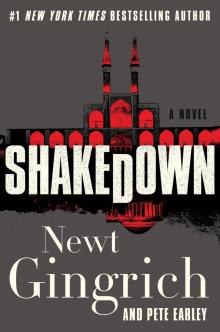 Shakedown
Shakedown A Nation Like No Other
A Nation Like No Other To Try Men's Souls - George Washington 1
To Try Men's Souls - George Washington 1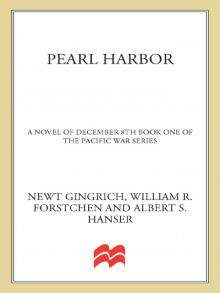 Pearl Harbor: A Novel of December 8th
Pearl Harbor: A Novel of December 8th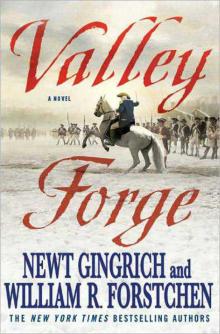 Valley Forge: George Washington and the Crucible of Victory
Valley Forge: George Washington and the Crucible of Victory To Save America
To Save America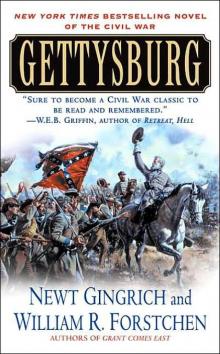 Grant Comes East cw-2
Grant Comes East cw-2 Victory at Yorktown: A Novel
Victory at Yorktown: A Novel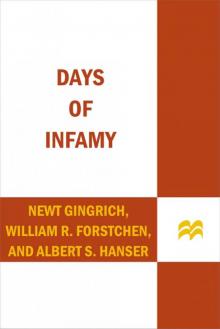 Days of Infamy
Days of Infamy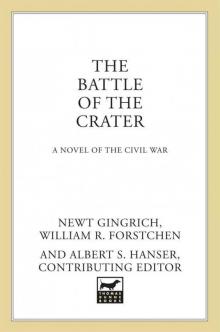 The Battle of the Crater: A Novel (George Washington Series)
The Battle of the Crater: A Novel (George Washington Series)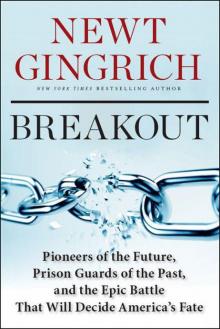 Breakout: Pioneers of the Future, Prison Guards of the Past, and the Epic Battle That Will Decide America's Fate
Breakout: Pioneers of the Future, Prison Guards of the Past, and the Epic Battle That Will Decide America's Fate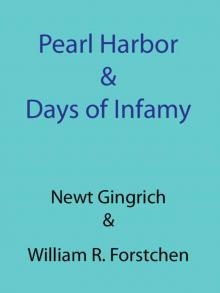 Pearl Harbour and Days of Infamy
Pearl Harbour and Days of Infamy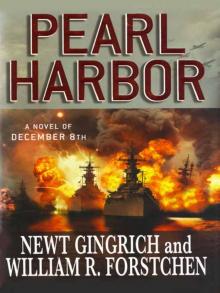 Pearl Harbour - A novel of December 8th
Pearl Harbour - A novel of December 8th Understanding Trump
Understanding Trump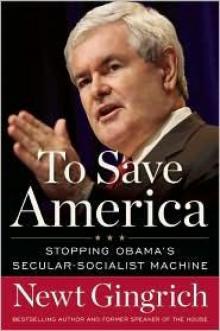 To Save America: Abolishing Obama's Socialist State and Restoring Our Unique American Way
To Save America: Abolishing Obama's Socialist State and Restoring Our Unique American Way